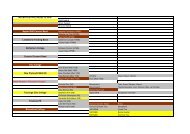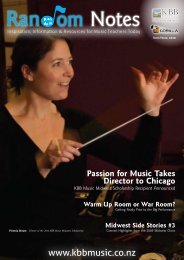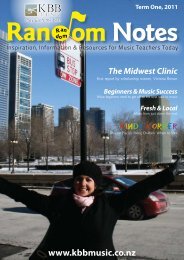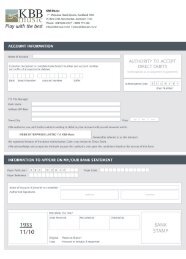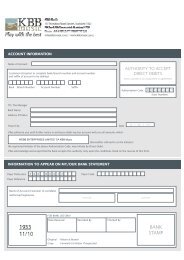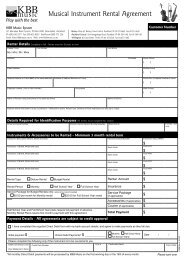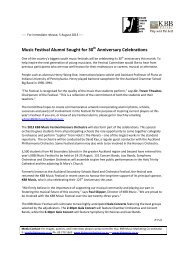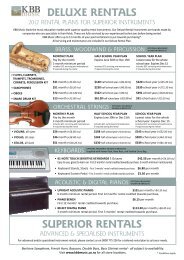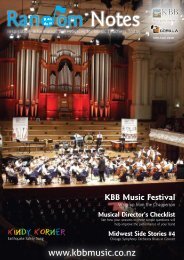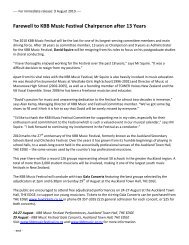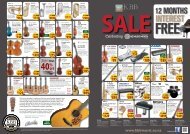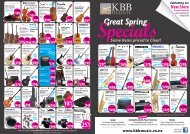choral briefs midwest clinic performance anxiety - KBB Music
choral briefs midwest clinic performance anxiety - KBB Music
choral briefs midwest clinic performance anxiety - KBB Music
You also want an ePaper? Increase the reach of your titles
YUMPU automatically turns print PDFs into web optimized ePapers that Google loves.
Developing <strong>Music</strong> Literacy<br />
with Ukulele<br />
By Maria Winder, music consultant, The Sound of <strong>Music</strong> Education<br />
& Trustee of NZ Ukulele Trust<br />
Photo: Trevor Villers<br />
For thousands of children in New Zealand, ukulele learning is opening<br />
up a whole new world of music knowledge and skills.<br />
<strong>Music</strong> knowledge and skills such as:<br />
• Learning to read ukulele TAB and chord charts and to<br />
strum and pick in a variety of styles<br />
• Developing understandings about keys, chord<br />
progressions and intervals<br />
• Learning to sing and to accompany singing<br />
• Learning to play by ear and to improvise<br />
• Learning about the structure of songs and to write original<br />
songs<br />
• Developing the ability to cooperate, negotiate, encourage<br />
others and participate in reciprocal music learning<br />
• Developing <strong>performance</strong> skills<br />
Cracking the Code - Reading Ukulele TAB<br />
Each of the horizontal lines in the TAB represents one of the<br />
strings on the ukulele.<br />
Hold your ukulele with the strings facing<br />
you. The top line of the TAB is the A<br />
string. This takes a little getting used to<br />
because it seems like it’s upside down.<br />
The line below the A string is the E string,<br />
the line below that is the C string and the<br />
bottom line is the G string (the one that’s<br />
closest to you when you are playing).<br />
The numbers that appear in the TAB indicate which string to<br />
play and which fret to put your finger on e.g. 0 indicates to play<br />
the open string; 1 indicates to put your finger on the first fret; 2<br />
indicates to put your finger on the second fret etc.<br />
When notes appear one after the other, horizontally in the TAB,<br />
you play them in sequence. The above TAB shows a C Major<br />
scale.<br />
Comparing notation systems<br />
Many ukulele musicians are new to reading music and once<br />
they crack the TAB code they often find it easier to understand<br />
other forms of notation e.g. C written in ukulele TAB = C note<br />
letter names on tuned percussion and keyboard = C written in<br />
conventional notation.<br />
NZ Ukulele Trust offers <strong>performance</strong> and songwriting opportunities for<br />
both primary and secondary school students.<br />
See www.nzukulelefestival.org.nz for details.<br />
• NZ Ukulele Development Squad Primary and Intermediate School<br />
students can apply to be part of the Development Squad, a group<br />
of approximately 35 students who perform as part of an orchestra,<br />
playing instrumental arrangements. Applications close 30th July. The<br />
Development Squad will perform at the Auckland Town Hall as part of<br />
the APPA <strong>Music</strong> Festival on 21st November and on the main stage at<br />
the NZ Ukulele Festival on 1st December.<br />
• APRA Uke-Can-Do-It Songwriting Competition has 3 categories:<br />
Primary, Secondary Students and Adults (so teachers can enter too!)<br />
Winners receive cash prizes and are invited to perform at the NZ<br />
Ukulele Festival. The overall winner will also receive a recording prize<br />
from MAINZ.<br />
• Ukequest encourages students to develop solo and group<br />
<strong>performance</strong> skills. Ukequest is a covers competition for Intermediate<br />
and Secondary School students. Groups must feature the talents of at<br />
least one ukulele player.<br />
• Kiwileles is the famous NZ Ukulele Trust massed schools orchestra.<br />
Over 2000 children from 117 schools in Northland, Auckland and<br />
Waikato have registered this year. The registration cost of $110 per<br />
school includes the 2012 Kiwileles Songbook and CD, 2 workshops for<br />
teachers, 6 regional rehearsals and the opportunity to participate in the<br />
Kiwileles <strong>performance</strong> and other activities at the NZ Ukulele Festival.<br />
Take up the challenge. Go to www.nzukulelefestival.org.nz and<br />
encourage your students to get involved. The ukulele is fun and a truly<br />
happy musical experience for both teachers and students alike.<br />
14 Random Notes <strong>Music</strong>al Instrument Specialists since 1888



